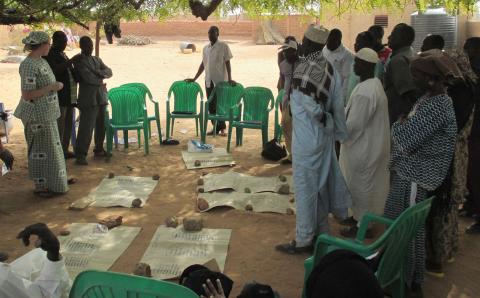Darlene and I attended the same church from birth. Yet I didn’t really notice her until she was a teenager and her swollen arm was in a sling because of a bee sting. A few weeks later, after I left for college, I sent her a playful note about her tiny attacker.
This note became the catalyst for our courtship and, later, our marriage. Curiously, the bee sting also was a precursor to significant pain in Darlene’s life. It was out of this crucible of pain—physical and emotional, and often without relief—that we reflected frequently on the apostle Paul’s encounter with pain that would not go away: “Three times I pleaded with the Lord to take [my thorn] away from me. But he said to me, ‘My grace is sufficient for you, for my power is made perfect in weakness’” (2 Cor. 12:8-9).
No Pass on Pain
One of life’s hard lessons is that living for Jesus does not give us a pass on pain. Christians are not exempt from suffering.The night before his unimaginable suffering on the cross, Jesus clearly warned his followers: “In this world you will have trouble” (John 16:33). Any notion that following Jesus is a ticket to a trouble-free life did not come from Jesus.
Life has happy times. Life has trouble.
The apostle Paul was an example of this. Within the Jewish tradition, he was a person of privilege and influence. As a follower of Jesus, he experienced “highs” such as being “caught up to paradise” and receiving “surpassingly great revelations” (2 Cor. 12:4, 7). But he also knew trouble—that “thorn in [his] flesh” that persisted in spite of his pleading with the Lord to take it away.
There was good stuff in Darlene’s life. She was a good daughter, a good student, and a good worker. As a wife, she loved me fiercely all her years. God gave us four daughters, 10 grandchildren, and even more “greats.” By most comparisons, she enjoyed pleasure and privilege.
But it also was hard to be Darlene. When she was 13, she was traumatized by her mother’s emotional breakdown. Years later, when she was her mother’s age and our oldest daughter was 13, Darlene recognized negative generational patterns. She decided to get help—psychodrama therapy, hypnotherapy, electroshock therapy, outpatient therapy, and inpatient therapy—45 years of it.
God used these means to help Darlene function reasonably well. Yet therapy also uncovered deep wounds—“thorns” that tormented her all her days. She pleaded with God, and so did the rest of us, to remove the thorns. Yet, over the years they became more deeply embedded, eventually leading to disability. In her final years, pain was a constant.
God’s Grace Is Enough
When God does not remove our pain, this does not mean that God has no answer. God’s answer is profound and life-giving: “My grace is sufficient for you” (2 Cor. 12:9). God’s answer to every need is his grace.
Grace comes in many forms.
For Darlene, grace came through four lively, lovely, and loving daughters. Grace came through meaningful work. Grace came through a small circle of friends. Grace came through caregivers.
In her homebound and bed-bound stages, grace came through extended family and visits from our pastor and other faithful church folks. Grace came through notes of encouragement from an African-American sister 10 years her senior. Grace came through grandchildren and great-grandchildren.
Above all, however, it is God’s grace that is sufficient. The good news is that “while we were still sinners, Christ died for us” (Rom. 5:8). Grace: God’s riches at Christ’s expense! Never is this grace more crucial than when we transition from this life to the next.
At one point in her final hours, Darlene was murmuring fitfully, “I will never say that again.” One of our daughters reassured her, “Don’t worry, Mom. Jesus died for us, and our sins are forgiven.” Darlene repeated over and over, “I’m forgiven, I’m forgiven, I’m forgiven.”
God has given his word on that: “My grace is sufficient for you.”
Power Through Weakness
God’s grace is sufficient because God’s power “is made perfect in [our] weakness” (2 Cor. 12:9). God does his best work through us when we yield to his purposes for us.
This truth became powerfully real to Darlene in her final days.
Back in 1984, our shrinking family moved from New Mexico to Michigan—me in one car, Darlene and our youngest daughter, Eva, in the other. My work required travel—a lot. Darlene and Eva were together—a lot. In 2005, in the aftermath of serious accidents and other painful circumstances, Eva and her two children moved in with us. Eight years later, Eva died. Her death was a crushing loss, especially to Darlene.
But here is the grace.
For Eva’s memorial service, we used the song “I Can Only Imagine” by Bart Millard as the soundtrack to her life in pictures. We played the song so often, it became Eva’s song:
Surrounded by Your glory
What will my heart feel? . . .
Will I sing “hallelujah”?
Will I be able to speak at all?
I can only imagine.
Every so often during Darlene’s lingering hours, one of our daughters would play “I Can Only Imagine.” One last time, when Darlene was no longer speaking, she heard those familiar words:
Will I sing “hallelujah”?
Will I be able to speak at all?
Amazingly, she mouthed the response: Hallelujah!
God was also at work in me.
Darlene spent 80 of her last 100 days in a hospital or rehab center. Each time, the discharge team strongly advised institutional care. And each time, Darlene strongly preferred coming home. To me, bringing her home seemed like a bad idea. Yet deep down, I already knew that God’s grace was sufficient for doing the right thing provided I was willing enough, humble enough, and trusting enough to submit. Upon release from her last rehab, even though I didn’t know how it could work, I just knew God wanted me to bring Darlene home.
Within a week of coming home again, she began declining rapidly. Our three daughters, who had already made cross-country trips to visit their mother, agreed to come again—this time to help usher her to her eternal home. During our final holy hours together, God gave us one more taste of grace. After I read several Scriptures, a daughter said, “Let’s sing ‘Softly and Tenderly Jesus Is Calling.’” As Darlene breathed her last, we were singing, “Come home, come home, you who are weary, come home; earnestly, tenderly Jesus is calling, calling,
O [daughter], come home!”
We were with her in our weakness.
God was with her, and with us, in his power.
About the Author
Alfred E. (Al) Mulder, an emeritus CRC minister, attends Madison Square Church in Grand Rapids. His wife, Darlene, died on August 7, 2017. Their surviving daughters are Bonny Mulder-Behnia, Diane Garcia, and Carla Huber.








